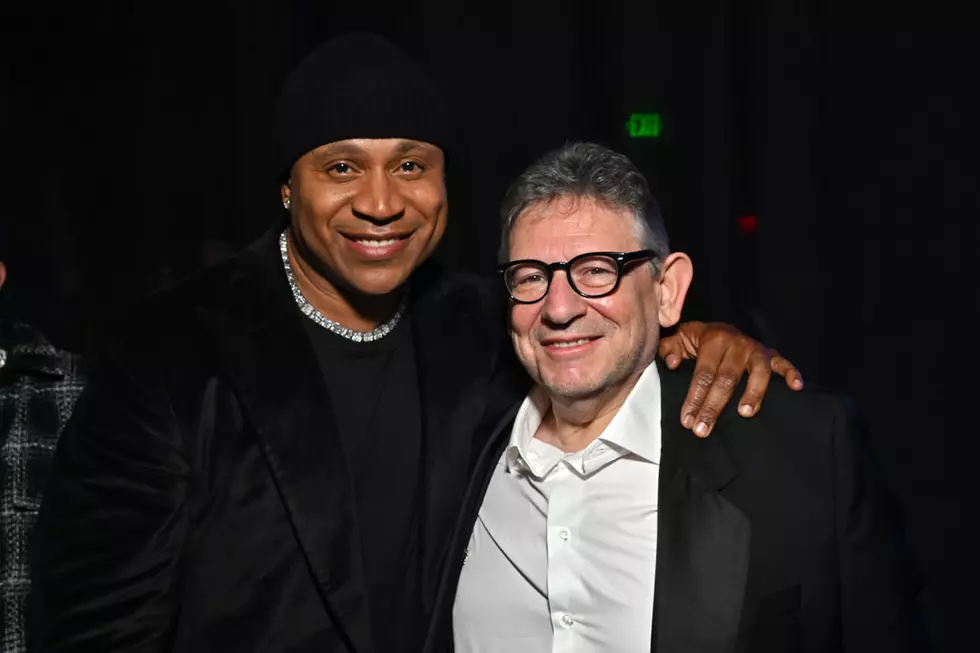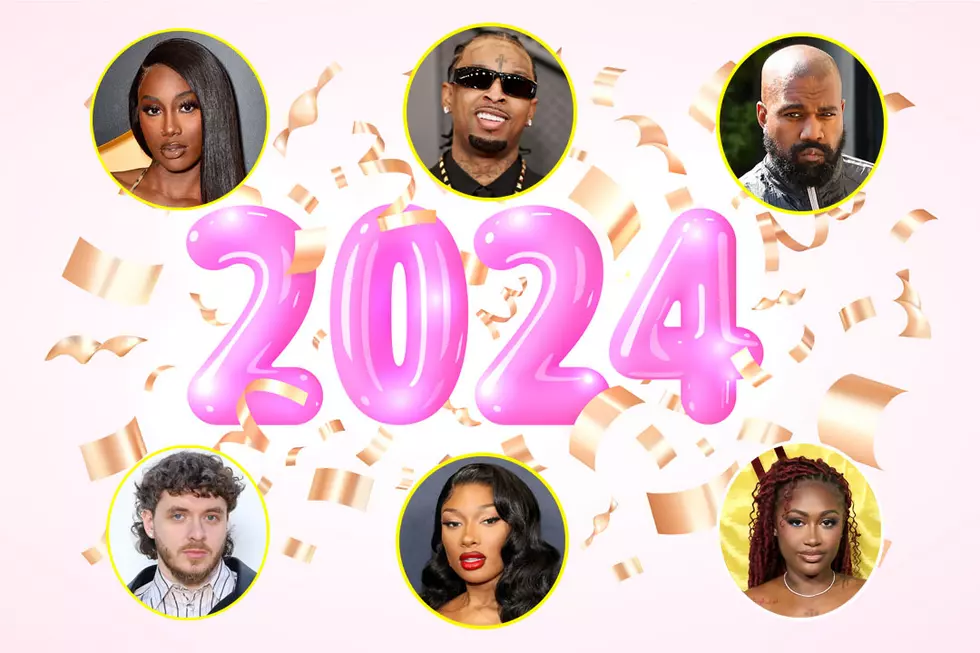
Raekwon Is The Elder Statesman Hip-Hop Still Needs
It's a late afternoon in mid-June, and Raekwon is sitting on a couch on the second floor of an apartment building next door to Frank's Chop Shop, the renowned barbershop on Manhattan's Lower East Side. The apartment—owned, I'm told, by an artist friend of his—is so steeped in history that it's almost suffocating: sketches and portraits line the walls; every surface holds another antique candelabra or lamp; the front door is plastered with postcards from Rome, Sydney, Cairo, San Francisco. And in one corner of it all sits the resident Mafia Don of the Wu-Tang Clan, one of the most distinctive voices hip-hop has heard in the past 20 years, and an irrefutable cornerstone in its history.
But Raekwon isn't here to talk about the potentially-upcoming sixth Wu-Tang album, A Better Tomorrow, nor is he here to talk about the Clan's one-of-a-kind secret LP that will reportedly be auctioned for millions. He's not here to talk about what he does on his off days—as one interviewer tried to find out—and he's definitely not here to talk about his recent issues with The RZA. Also off the table is the newborn baby hoax that Rae was fooled by after seeing a post on the Internet the week before, and the former Wu-Tang affiliate who cut off his penis earlier in the year (though it's unclear if anyone had the, well, balls, to ask about that one). Raekwon is here to talk about two things: his headlining performance at next month's Brooklyn Hip-Hop Festival, and his own upcoming sixth solo album, F.I.L.A. (Fly International Luxurious Art), due out September 16.
Which is fair enough; most people would say that a hip-hop OG with more than 20 years under his belt and multiple classics on his resume has earned the right to be choosy about what he speaks on. But Raekwon has always held himself differently from the rest of his Shaolin brethren; whereas Method Man can be aloof, Ghostface impossible to track down, RZA unbelievably busy and GZA too caught up in his pet projects, Rae has always been the most accessible of the Wu's high-profile Gambinos (with all due respect to Inspectah Deck, U-God and Masta Killa, of course). And now, with F.I.L.A. slated for this Fall and a new generation born after 1993's Enter The Wu-Tang: 36 Chambers had already left its mark making their own waves in the game, he's begun looking towards collaborating with those on the come up rather than eyeing up the competition of his peers.
"I'm a coach, you know what I mean? I used to be a player, and now I'm a coach, but a coach that still plays," he says of his influence on the younger generation, sipping from a tumbler of Hennessy and re-lighting a blunt. "I think, being in the game as long as we've been in it, I wanna see some of my favorites today last as long [as we have]. So even when we rapping and we getting our music, you can bet your ass that we're talking about real life shit. We don't just talk about music, we talk about life, we talk about direction, we talk about you getting your blessing, and I think that's why a lot of the time a lot of these cats, they love me, because they say, 'Yo, he don't change. If there's something he like, he gonna tell you, if there's something he ain't feeling, he gonna tell you, too.'"
And Raekwon doesn't just talk the talk behind the scenes; in the past year, he's lent verses to the likes of Rapsody, Troy Ave, Action Bronson, ScHoolboy Q and Mack Wilds, to name a handful. He's been leading by example, something that few of his age and stature—Bun B and Scarface excluded—have done with any real consistency. And it's paid back in small gestures; Jay Electronica turned down the headlining slot at the Brooklyn Hip-Hop Festival this year in order to go on before Raekwon, an offering of respect to a man who paved the way for an entire sub-genre of hip-hop to thrive and flourish.
"I ain't even know he said that," Raekwon says when I bring it up. "For me, it don't matter who goes first and who goes last; they coming to see us. Of course I think the same way he thinks, too—I couldn't see myself going into an arena with a big giant and not even thinking like that—but I respect him enough for him to even look at it like that."
The Brooklyn Hip-Hop Festival is a homecoming for The Chef that's more personal than most would realize. Despite being most known for his role in Staten Island's most notorious hip-hop crew, Rae was actually born in Brooklyn, and lived there for a few years before his single mother moved the family to Shaolin. "When I think of Brooklyn, I think of, what if my mother didn't make the decisions she made to put me in a position to be who I am today?" he says. "Sometimes, to really just be grounded again, you gotta go certain places in Brooklyn just to feel where you used to be just so you don't get too past yourself."
As Raekwon tells these stories, specifically the ones about his personal life, his attention never wavers, and he doesn't break eye contact except to look down, re-light his blunt, hit it again. The room, cluttered as it is with trinkets and tables, is also strewn with people occupying every seat, meaning the only place left to sit and speak with Raekwon is on the floor, sitting at his feet. It's an odd position to be in as an interviewer—it immediately shifts the power dynamic in his favor, for instance—but when he's talking about coming back to Brooklyn and tapping into old memories, it's a little like asking your grandfather about the Old Days and knowing it wouldn't be smart to interrupt.
"I remember the other day, I took my young son with me to where my father was from, and I showed him the neighborhood," he says. "And this was totally different, because [my son] lived suburban; he never lived urban like that. But just for him to be able to see that culture and know that that's a part of his culture, it just shows you that you could come from anywhere and make it, as long as you feel you wanna make it."
The connection between the old and the new is, again, something that Raekwon is striving to bridge by more than just talking about it. After all, in September 2009—more than 14 years after his debut album—he released Only Built 4 Cuban Linx...Pt II, successfully updating and revamping the storyline of the original to create one of the best albums of the past five years. And in addition to hopping on records with some of the younger artists in the game—which, it should be noted, helps him stay relevant as much as it helps them gain credibility—he's aiming to make his next album, F.I.L.A., toe the same line.
"My thing is just to make a great body of work, and this one is very authentic; it's today and yesterday all in one, and you gonna feel good about hearing a real good hip-hop album with a great MC on top of it," he says. "My thing is to just give quality, prestigious hip-hop all the time, which you expect from me, and more of what's going on today."
A good chunk of what's going on today in hip-hop—Drill music, trap music, ratchet music, and the list goes on—has largely made the dirty, classic boom bap of Raekwon's generation a relic of decades past. But unlike some of his esteemed peers, Rae has never been held back by history or held down by tradition. In a genre evolving faster than it fully understands, Raekwon understands better than most that it's the fans, not the artists, that hold the ultimate key to a successful career.
"When you can pull crowds of people together and you see enjoyment through them, I can't determine what they don't like. I can just look at them and say if you're having a good time with it or not," he says about how hip-hop has evolved. "I think everybody is just expressing their freedom of being creative. It's just all about making great music, man, and just feeding your family and feeding your crew." —Dan Rys
Previously: Raekwon Doesn’t Feel Any Release Date Competition With 50 Cent And Game
Raekwon “Wishing On A Star”
Couple Fooled The Internet Into Thinking They Named Their Newborn Twins Ghostface And Raekwon
Raekwon And RZA Call Truce
More From XXL









